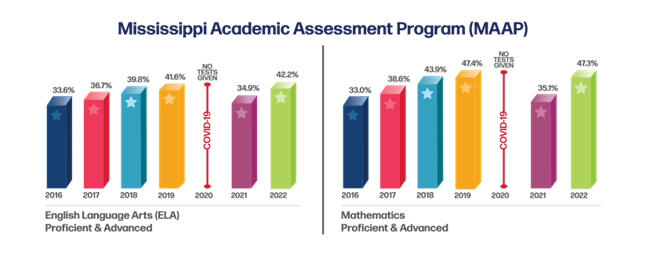NEWS RELEASE
For Immediate Release: 11 a.m., Aug. 18, 2022

JACKSON, Miss. – The Mississippi Department of Education (MDE) released today statewide results from the 2021-22 Mississippi Academic Assessment Program (MAAP), which show student achievement exceeding pre-pandemic levels in English Language Arts (ELA) and science and nearly tying in mathematics.
Overall, the percentage of students scoring proficient or advanced reached an all-time high of 42.2% in ELA and 55.9% in science, and reached 47.3% in mathematics, just shy of the pre-pandemic rate of 47.4%.
Pre-pandemic, student achievement steadily increased from the first administration of MAAP in 2016 until 2019, when the percentage of students scoring proficient and advanced reached a record high. The pandemic created obstacles to teaching and learning throughout 2020-21, and overall student achievement declined in Mississippi and nationally.
|
Subject |
2019 |
2020*
|
2021 |
2022 |
Change since 2019 |
|
Mathematics |
47.4% |
|
35.1% |
47.3% |
-0.1% |
|
English Language Arts (ELA) |
41.6% |
COVID-19 |
34.9% |
42.2% |
+0.6% |
|
Science |
55.3% |
|
50.0% |
55.9% |
+0.6% |
*No assessments given due to statewide school closures at the start of COVID-19 pandemic.
“The 2021-22 assessment results provide clear and indisputable evidence of the resilience of our students and educators and their ability to recover from the disruptions to learning,” said Dr. Kim Benton, state superintendent of education, interim. “We are confident Mississippi educators and school leaders across the state will continue to build upon this progress by setting high expectations and working to ensure every student in every school overcomes the setbacks of the pandemic and is successful.”
MAAP measures students’ progress toward academic goals that equip them with the skills and knowledge they need to succeed in college and the workforce. Mississippi teachers helped develop MAAP tests, which align with the learning goals for Mississippi classrooms. MAAP measures student performance in ELA and mathematics in grades 3-8, science in grades 5 and 8, and in high school English II, Algebra I, Biology and U.S. History.
The state administered a new U.S. History assessment in 2020-21; the percentage of students scoring proficient or advanced on this assessment increased from 47.4% in 2020-21 to 69.3% in 2021-22.
By 2021-22, districts had more experience managing pandemic disruptions and were provided with additional support, including federal COVID-19 relief funds and state investments to help accelerate learning. The additional funds enabled districts to pay for extended learning days, tutorial services and intensive interventions, among other supports. State investments include the Mississippi Connects digital learning initiative, which provided all students with a computer device, and services including on-demand tutoring, high-quality digital curriculum subscriptions and access to digital learning coaches.
“There have been incredible efforts in districts and at the state level to remove barriers for students,” Dr. Benton said. “We still have students in areas of the state who have not completely rebounded. Support will continue to be available in the upcoming school year and next summer to make sure every student is able to recover from the disruptions to their learning and narrow achievement gaps.”
The overall increase in assessment scores in 2021-22 after the decline in 2020-21 will likely impact district and school grades because the calculation of the state’s A-F accountability grades relies heavily on the amount of progress students make from one year to the next. Overall, students made significant progress between 2020-21 and 2021-22, as schools focused on accelerating learning after the first year of the pandemic. In addition, the passing requirements for high school Algebra I, English II, Biology and U.S. History were waived in 2020-21, which will affect the graduation rate until all students who tested under the waivers graduate.
Accountability grades for the 2021-22 school year will be released at the Mississippi State Board of Education meeting on Sept. 29.
Pre-pandemic, Mississippi had become a national leader in education because students were making faster progress than nearly every other state. Several factors contributed to the steady rise in student achievement including the implementation of higher academic standards and statewide support to teachers to help students reach higher standards. Other factors include the effective implementation of several education reform laws and policies that developed or strengthened early childhood education, literacy instruction, school and district accountability, and advanced learning opportunities for high school students.
View MAAP Results Executive Summary and District- and School-level Results Report:
mdek12.org/OPR/Reporting/Assessment/2021-22
Find all MDE news releases at mdek12.org/news.

